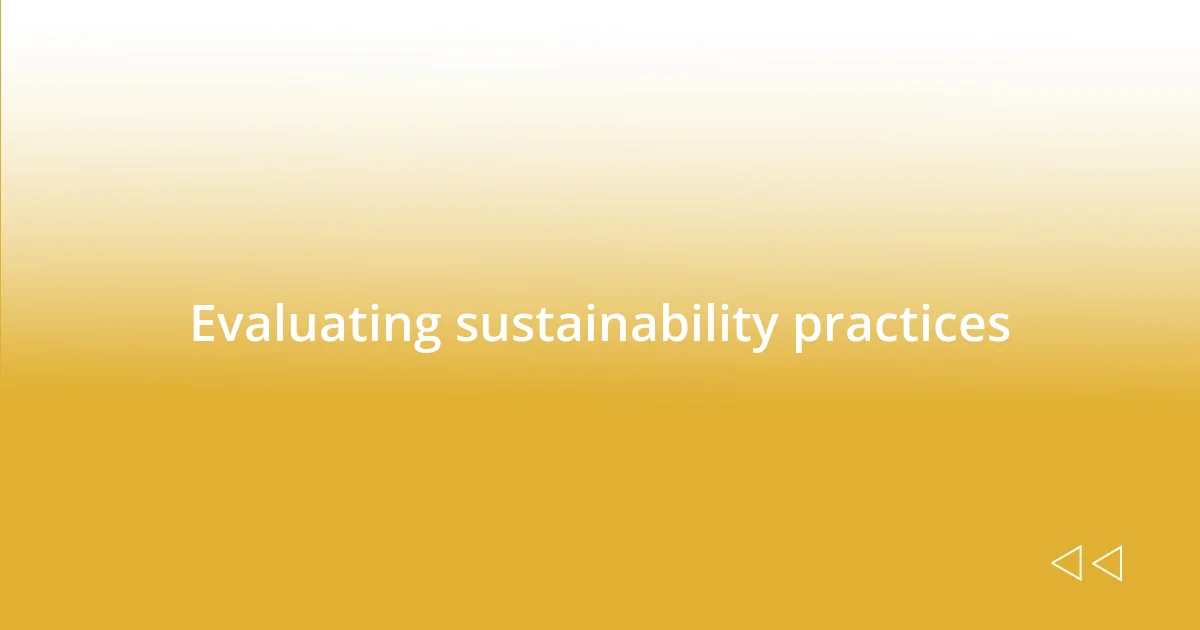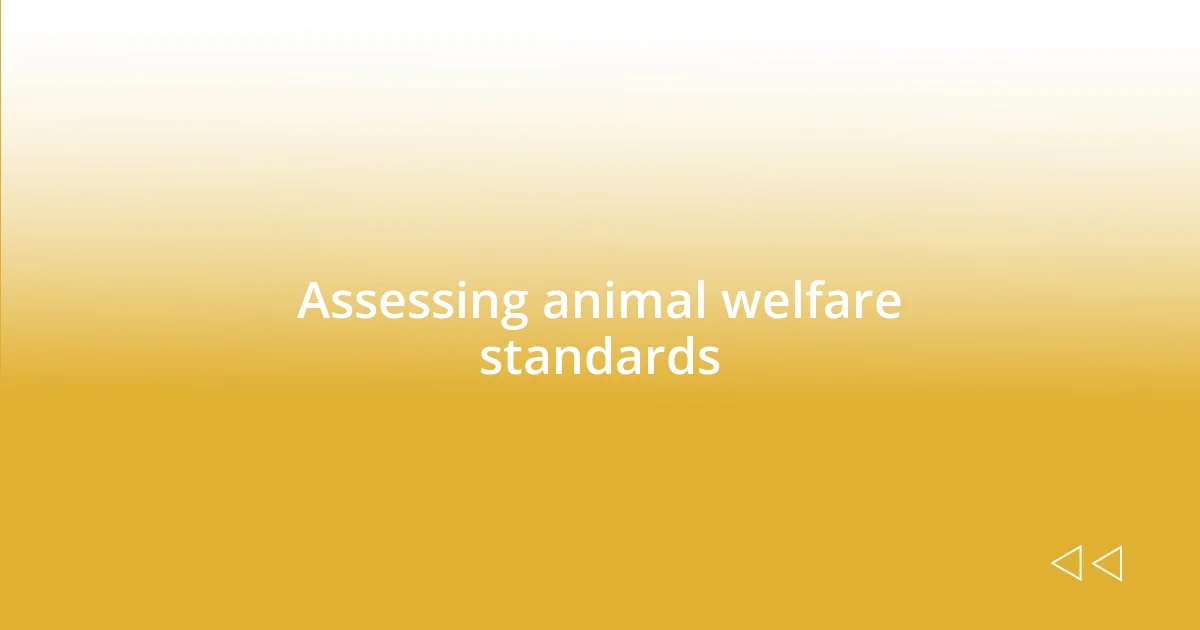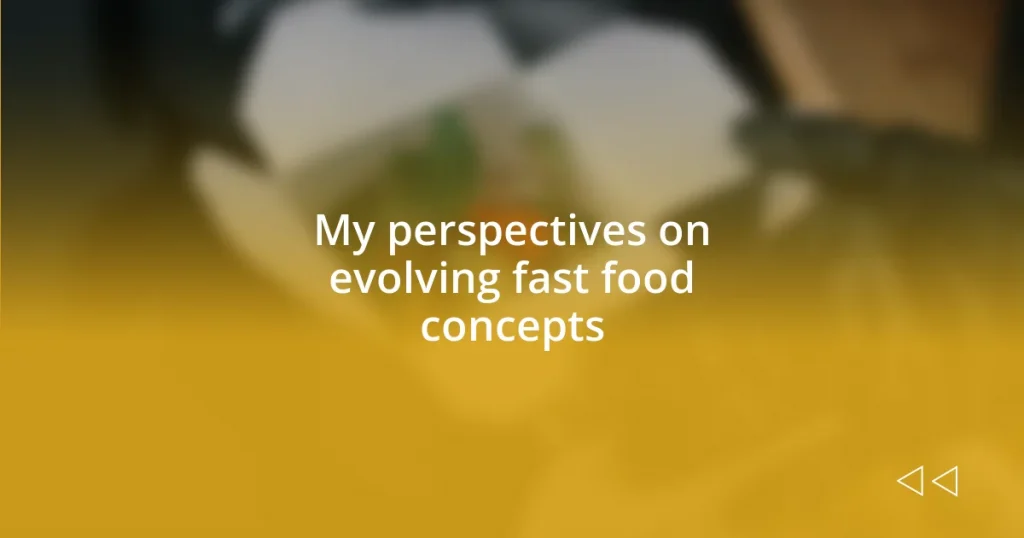Key takeaways:
- Ethical fast food emphasizes sustainability, animal welfare, and transparency, influencing consumer choices and supporting responsible sourcing practices.
- Key factors in ethical dining include ingredient sourcing, animal welfare standards, community engagement, and environmental impact, which enhance the overall dining experience.
- Connecting with local ethical vendors and understanding food origins fosters a sense of community and enhances appreciation for meals, highlighting the importance of informed choices.

Understanding ethical fast food
Understanding ethical fast food revolves around prioritizing sustainability and animal welfare. When I’m at a fast-food joint, I can’t help but think, “Where did this food come from?” It’s a question that pushes me to seek options that align with my values, both for my well-being and the planet’s.
Ethical fast food often means choosing places that source their ingredients responsibly. I remember visiting a local spot that proudly displayed its commitment to free-range meats and organic produce. It felt good to know that my meal supported farmers who treat their animals and land with respect; there’s something inherently satisfying about making choices that resonate with my conscience.
Furthermore, transparency is key in ethical food choices. I often find myself connecting with brands that openly share their sourcing practices. Reflecting on a time when I discovered a restaurant that highlights its environmental impact made me realize how much I value that openness. It’s not just about eating; it’s about being part of a larger movement that encourages responsibility and care in our food systems. How about you? Have you noticed how ethical practices influence your food choices?

Factors influencing my choice
When it comes to choosing where to eat, several factors weigh heavily on my mind. One key aspect is the ingredient sourcing; I find myself leaning towards places that promote local and organic produce. The moment I took a bite into a burger made from grass-fed beef, I felt a sense of pride knowing it came from a local farm I could trust. The taste was richer, but more importantly, I knew I was supporting sustainable practices.
Here are a few factors that influence my choices when it comes to ethical fast food:
- Transparency in sourcing: I tend to favor brands that openly share where their ingredients come from.
- Animal welfare standards: The commitment to humane treatment of animals can sway my decision significantly.
- Environmental impact: I appreciate restaurants that emphasize eco-friendly practices, like composting or energy-efficient operations.
- Community engagement: Establishments that invest in their local communities resonate deeply with me.
- Nutritional value: I look for options that not only satisfy my taste buds but also nourish my body.

Evaluating sustainability practices
Evaluating sustainability practices in fast food requires looking beyond the menu and understanding the broader impacts of our choices. For instance, I recall a visit to a chain that made a point to showcase its sustainable seafood sourcing. When I learned that the fish was caught using methods that protected marine life, I felt a deep connection to the ocean and its fragile ecosystems. It’s amazing how a meal can awaken awareness of such crucial issues.
In my experience, the use of recyclable and compostable packaging plays a significant role in my dining decisions. It’s one thing to serve a delicious meal, but when I see restaurants actively working to reduce waste, it builds a sense of trust. During a recent lunch at a place that proudly displayed its composting practices, I felt empowered knowing I was part of a solution rather than contributing to a problem.
On a practical level, I appreciate brands that set measurable goals for their sustainability efforts. For example, I was pleasantly surprised to find out that a local recycles 95% of its waste. This dedication motivates me to choose their food over others, knowing that my choice contributes to a more sustainable future.
| Sustainability Practice | Example |
|---|---|
| Ingredient Sourcing | Locally sourced, organic produce |
| Waste Management | Recyclable and compostable packaging |
| Animal Welfare | Free-range and humane standards |
| Environmental Impact | Reduction of carbon footprint initiatives |
| Community Engagement | Supporting local farmers and charities |

Assessing animal welfare standards
When it comes to animal welfare standards, I prioritize establishments that go above and beyond in ensuring humane treatment. I remember visiting a farm-to-table restaurant where the owner shared stories about their commitment to ethical sourcing. Hearing about the happy lives of their animals made me feel connected, reminding me why animal welfare matters—not just for ethics, but for the quality of the food we consume.
I often wonder how much thought we really put into the sources of our meals. Recently, I scanned a fast-food menu and noticed a note about their free-range chicken policy. That transparency resonated with me; it felt rewarding to know that those chickens had more space and better living conditions. It made me curious—what does the journey of my food look like, from farm to table?
I also reflect on the standards set by organizations that advocate for animal welfare. For example, during one dining experience, I learned that the beef I enjoyed was certified by a well-known animal welfare program. The feeling of satisfaction I felt after that meal was immense; supporting a business that aligns with my values gave me hope. Doesn’t it feel good to make choices that not only satiate our hunger but also contribute positively to animal lives?

Exploring ethical sourcing
When I think about ethical sourcing, I often recall a time when I discovered a burger joint that proudly sourced its beef from local farms. The owner shared how these farms practiced rotational grazing, which not only helped the environment but also enhanced the flavor of the meat. It was a revelation; knowing my meal came from thoughtful practices deepened my appreciation for the food and the effort behind it.
I remember sitting down with friends at a café that featured fresh produce sourced from nearby farms. As we enjoyed our salads, the conversation turned to the origins of our ingredients. It struck me how important it is to support local farmers who are invested in sustainable practices. Have you ever considered how much more meaningful a meal feels when you know the story behind your food? The connection to the community made each bite even more enjoyable.
During another outing, I learned about a fast-casual restaurant that actively partnered with organizations focused on ethical sourcing. They provided detailed information about their ingredient origins right on the menu. This transparency not only built trust but also made me feel like a participant in their mission. Isn’t it refreshing to see businesses take responsibility and allow us to make informed choices? This level of engagement encourages me to seek out and support those ethical practices in my dining experiences.

Making informed menu choices
I find that making informed menu choices is essential to my dining experience. Once, while browsing a fast-food restaurant’s offerings, I stumbled upon a dish labeled as “sustainably farmed.” Intrigued, I asked the staff about it and learned that the fish was caught using methods that protect both the ecosystem and the fish population. I felt a sense of pride in choosing something that contributed to environmental sustainability. How often do we pause to investigate what’s really on our plates?
Another time, I visited a trendy taco stand that highlighted its commitment to using organic vegetables. As I bit into the vibrant tacos bursting with flavor, I couldn’t help but think about the farmers behind those ingredients. Their dedication to sustainable farming added another layer of enjoyment to every bite. Don’t you think that our connection to the food we eat can transform ordinary meals into extraordinary experiences?
I often look for menus that clearly indicate where the ingredients come from, as it allows me to align my choices with my values. One afternoon, I noticed a café displaying a “trace your meal” QR code right on the menu. Scanning it revealed the farms for each ingredient, from the lettuce to the chicken. This level of transparency fostered a sense of trust; it felt empowering to know I was supporting practices that resonate with me. Isn’t it incredible when dining out becomes not just a meal, but a conscious choice?

Supporting local ethical vendors
Supporting local ethical vendors has truly transformed my approach to eating out. I vividly remember walking into a small family-owned café that featured a mural showcasing the nearby farms they sourced from. That connection was immediate; it felt like each meal was a celebration of the local community. Why wouldn’t I want to support those who keep our local economy thriving?
On another occasion, I visited a farmer’s market stand that sold handmade sausages from a vendor who raised his animals on his own land. As he passionately described his farming practices, I couldn’t help but feel inspired by his dedication. It was evident that this wasn’t just a business for him; it was a labor of love. Have you ever felt that same sense of passion and pride reflected in your meal? It makes a difference.
The last time I tried a new fast-casual place, I learned that they sourced their bread from a local artisan baker, who in turn, only used grain from nearby fields. That experience wasn’t just about eating; it became a story I could share. I felt better knowing that my choices supported ethical standards and environmental responsibility. Isn’t it wonderful to envision a system where every bite contributes positively to our community?















